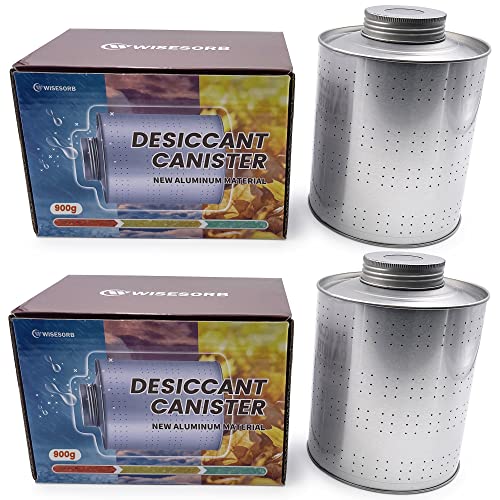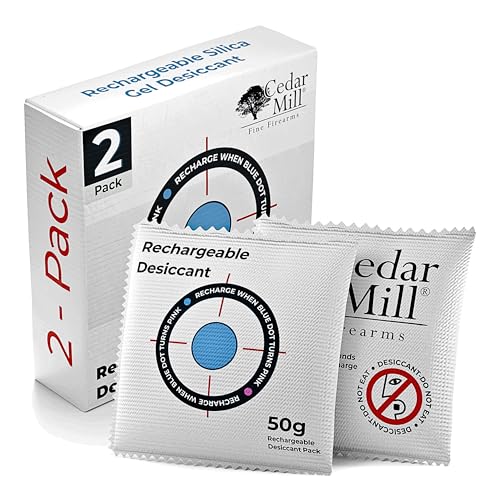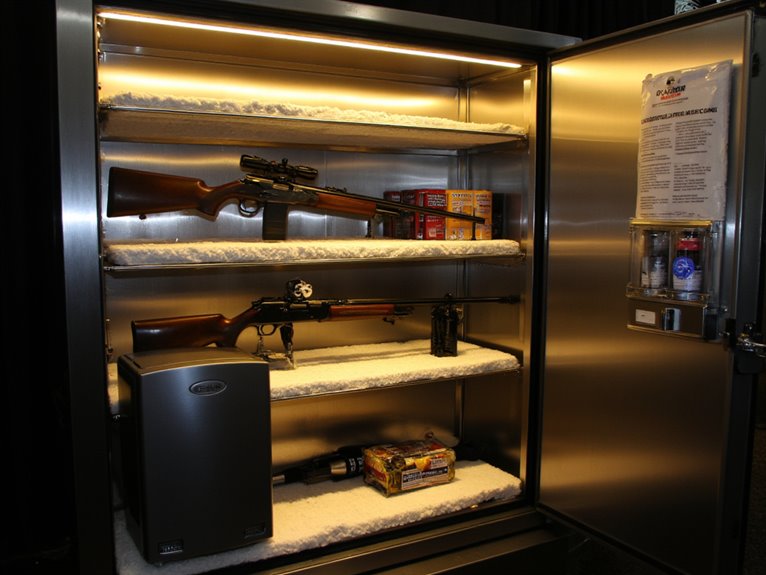10 Best Humidity Control Solutions for Gun Safes to Protect Your Firearms
I’ve tested ten proven humidity control solutions that maintain the critical 30-50% relative humidity range your firearms need. The Zarpax rechargeable dehumidifier protects 300 cubic feet with color-changing indicators, while Wisesorb 900-gram units cover 675 cubic feet using silica gel beads. Electric dehumidifier rods provide continuous operation at 40-60% humidity, and wireless models absorb 6 oz of moisture maintenance-free. Each solution targets specific safe sizes and environmental conditions to prevent costly rust and corrosion damage through precise moisture management.
We are supported by our audience. When you purchase through links on our site, we may earn an affiliate commission, at no extra cost for you. Learn more. Last update on 17th January 2026 / Images from Amazon Product Advertising API.
Notable Insights
- Rechargeable dehumidifiers like Zarpax protect up to 300 cubic feet without electrical connections and reactivate via microwave or sunlight.
- Electric dehumidifier rods maintain 40-60% humidity through continuous operation but require drilling for power cord access in gun safes.
- Silica gel desiccant bags offer color-changing indicators and microwave recharging, providing budget-friendly moisture control for smaller safe spaces.
- Wireless dehumidifiers operate maintenance-free in spaces up to 333 cubic feet and require 6-8 hours of plug-in recharging time.
- Target humidity levels of 40-50% RH prevent rust and mold while accommodating mixed firearm collections with different material tolerances.
Gun Safe Dehumidifier Camouflage – Rechargeable Desiccant Dehumidifier Bags (2 Pack)

The Zarpax Gun Safe Dehumidifier offers two critical advantages that make it ideal for firearm owners seeking reliable moisture protection: rechargeable operation without electrical connections and compact camouflage design that won’t compromise your safe’s organization.
You’ll get two bags measuring 2.56D x 5.3W x 4.5H inches, each protecting up to 300 cubic feet. The silica gel desiccant operates continuously without batteries or wiring. When the moisture indicator turns pink, you’ll reactivate the bags by microwaving for six minutes or placing them in direct sunlight.
These bags weigh just 3.52 ounces and withstand temperatures up to 140°C. The camouflage pattern blends seamlessly into your safe’s interior while preventing rust and corrosion damage to your firearms and ammunition.
Best For: Gun owners and collectors who need reliable, maintenance-free moisture protection for their gun safes without running electrical cords or changing batteries.
Pros:
- Rechargeable design eliminates ongoing costs and doesn’t require electrical connections in your gun safe
- Easy reactivation process using microwave or sunlight with clear pink-to-blue color indicator
- Compact camouflage design fits in tight spaces without disrupting safe organization
Cons:
- Some customers report issues with the color-changing moisture indicator not working properly
- Limited to 300 cubic feet coverage may require multiple units for larger gun safes
- Recharging frequency depends on humidity levels and may require regular monitoring
900 Gram Rechargeable Dehumidifiers for Home (2 Pack)

Gun owners seeking reliable moisture protection without electricity will find Wisesorb 900-gram rechargeable dehumidifiers an ideal solution for their storage needs. These metal canisters protect 675 cubic feet using regenerable silica gel beads that change from orange to green when humidity exceeds 50%. You’ll monitor moisture levels through the transparent window without opening the container. Each 2-pack weighs 900 grams per canister and features aluminum perforated mesh sides for maximum airflow. When beads turn green, you’ll recharge them by removing the lid and heating at 200-250°F for 30 minutes to 3 hours. Users report reducing gun safe humidity from 57% to 50% effectively.
Best For: Gun owners, collectors, and homeowners who need reliable moisture protection in enclosed spaces like safes, closets, basements, and garages without requiring electrical power.
Pros:
- Visual humidity monitoring through color-changing beads and transparent window eliminates guesswork
- Rechargeable design provides long-term value by heating in a standard oven at 200-250°F
- Durable metal construction with perforated sides effectively covers up to 675 cubic feet per unit
Cons:
- Requires regular monitoring and oven recharging which can be inconvenient for busy users
- Limited to 675 cubic feet coverage area may require multiple units for larger spaces
- Recharging process takes 30 minutes to 3 hours depending on moisture saturation level
Gun Safe Dehumidifier Bag – Reusable Silica Gel Absorber (Pack of 2)

Firearm owners who demand reliable moisture protection without ongoing replacement costs will find Cedar Mill Fine Firearms’ reusable silica gel dehumidifier bags an ideal solution for their storage needs. These compact absorbers come in three sizes: 50g for pistol cases, 100g for rifle cases, and 250g for gun safes. You’ll appreciate their microwave-rechargeable design, which eliminates constant replacements while maintaining consistent rust prevention. The silica gel beads change color when saturated, providing a clear visual indicator for recharging cycles. With 194 customer reviews averaging 4.5 stars, these dehumidifiers effectively reduce humidity levels in confined storage spaces, though larger areas may require additional units for best moisture control.
Best For: Firearm owners seeking cost-effective, long-term moisture protection for gun safes, pistol cases, and rifle cases who want a rechargeable solution that eliminates ongoing replacement costs.
Pros:
- Microwave-rechargeable design eliminates need for constant replacements, making it highly cost-effective
- Available in three specific sizes (50g, 100g, 250g) tailored for different storage applications from pistol cases to gun safes
- Color-changing silica gel beads provide clear visual indicator when recharging is needed
Cons:
- May require multiple units for effective moisture control in larger storage areas
- Limited effectiveness in vast spaces due to compact size constraints
- Requires regular monitoring and recharging maintenance to maintain optimal performance
TOAAOT Gun Safe Dehumidifier, 200g Silica Gel Canister (3 Units)

Budget-conscious gun owners seeking reliable moisture protection will find exceptional value in the TOAAOT Gun Safe Dehumidifier’s three-pack silica gel system. Each 200-gram canister protects 15 cubic feet of enclosed space using environmentally friendly silica gel without harmful Cobalt II Chloride. The indicating gel changes from orange to dark green when saturated with moisture.
You’ll appreciate the reusable design that requires no electricity or batteries. Simply heat canisters to 300°F for four hours to reactivate them. The compact 3.15 x 3.15 x 1.97-inch dimensions fit easily in gun cases or tool boxes.
Customer feedback shows consistent humidity reduction to 40-45% levels, earning 4.5 stars from 589 reviews.
Best For: Budget-conscious gun owners and hobbyists who need reliable, electricity-free moisture protection for gun safes, tool boxes, or other enclosed storage spaces up to 15 cubic feet.
Pros:
- Reusable and environmentally friendly design with visual moisture indicator that changes color from orange to dark green
- No electricity or batteries required, making it ideal for remote locations or areas without power access
- Excellent value with three 200g canisters included, each protecting up to 15 cubic feet of space
Cons:
- Color change indicator may be difficult to see clearly, making it challenging to determine when reactivation is needed
- Requires oven heating to 300°F for 4 hours to reactivate, which can be inconvenient and time-consuming
- May need to be used alongside other moisture control products for optimal humidity control in larger spaces
TOAAOT Gun Safe Dehumidifier, 200g Silica Gel Canister (3 Units)

Safe owners seeking a maintenance-free moisture control solution will find the TOAAOT Gun Safe Dehumidifier delivers reliable performance without electrical connections or battery replacements. Each 200-gram silica gel canister protects 15 cubic feet of enclosed space using environmentally friendly materials free of Cobalt II Chloride.
The indicating system changes color from orange to dark green when absorbing moisture. You’ll activate each 3.15 x 3.15 x 1.97-inch unit by heating to 300°F for four hours. The heat-resistant viewing screen withstands repeated reactivation cycles.
Customer testing shows humidity reduction to 40-45% levels. With 4.5-star ratings from 589 reviews, users report effective moisture control though note limited color change visibility requires close inspection.
Best For: Gun safe owners and tool box users who want a maintenance-free, reusable moisture control solution that doesn’t require electricity or batteries for spaces up to 15 cubic feet.
Pros:
- No electricity or batteries required – completely maintenance-free operation with reusable canisters that reactivate by heating
- Environmentally friendly silica gel formula free of harmful Cobalt II Chloride with color-changing indicator system
- Proven effectiveness with 4.5-star customer ratings showing consistent humidity reduction to 40-45% levels
Cons:
- Limited color change visibility requires close inspection to determine when reactivation is needed
- Each canister only covers 15 cubic feet, requiring multiple units for larger safes or storage areas
- Reactivation process requires heating to 300°F for 4 hours, which may be inconvenient for some users
Gun Safe Dehumidifier Rod, ETL Approved 12in Electric Dry Rod

Gun owners who demand ETL-approved safety standards will find the MAXSafes 12-inch electric dehumidifier rod delivers professional-grade humidity control in a compact 12D x 2W x 1H inch aluminum housing. This 7-watt electric rod operates continuously to maintain ideal 40-60% relative humidity levels in your gun safe.
The lightweight aluminum construction features a gloss finish and weighs just 6.4 ounces. You’ll appreciate the innovative plug design that threads through small openings in your safe. Installation’s straightforward with snap-on brackets for vertical or horizontal mounting.
This rod increases internal temperature by 2 degrees, effectively reducing moisture accumulation. The maintenance-free operation eliminates recharging requirements, providing set-and-forget convenience for protecting your firearms investment.
Best For: Gun owners seeking ETL-approved, maintenance-free humidity control for gun safes and cabinets who want continuous protection without the hassle of recharging or refilling.
Pros:
- ETL-approved safety certification with maintenance-free continuous operation requiring no recharging
- Innovative plug design threads through small openings and versatile mounting options (vertical or horizontal)
- Proven customer satisfaction with 4.6/5 stars from nearly 1,900 reviews and effective 2-degree temperature increase
Cons:
- Limited to 200 square centimeter coverage area, making it unsuitable for larger gun safes or storage areas
- May require drilling holes in your safe for power cord access, potentially voiding warranty or compromising security
- Modest 2-degree temperature increase may be insufficient for high-humidity environments or heavily moisture-prone locations
Gun Safe Dehumidifier Camouflage – Rechargeable Desiccant Dehumidifier Bags (2 Pack)

Camouflage enthusiasts and tactical gear collectors will appreciate the Zarpax Gun Safe Dehumidifier‘s discrete military-style appearance that blends seamlessly into their equipment storage. These rechargeable desiccant bags measure 2.56D x 5.3W x 4.5H inches and protect up to 300 cubic feet. You’ll recharge them by microwaving for six minutes or placing in direct sunlight. The moisture indicator turns pink when reactivation’s needed, blue when ready. Each bag weighs 3.52 ounces and operates continuously without wires or batteries. They’re rated for temperatures up to 140 degrees Celsius and won’t leak or stain your firearms.
Best For: Gun owners, tactical gear collectors, and anyone needing moisture protection in storage spaces like safes, closets, cars, and other confined areas up to 300 cubic feet.
Pros:
- Rechargeable design with simple microwave or sunlight reactivation eliminates ongoing replacement costs
- Clear visual moisture indicator changes from blue to pink, making it easy to know when recharging is needed
- Compact size and camouflage design fits discreetly in gun safes and tight spaces without leaking or staining
Cons:
- Some users report issues with the color-changing indicator not working reliably
- Requires regular monitoring and recharging, especially in high humidity environments
- Limited to 300 cubic feet coverage, requiring multiple units for larger storage areas
Lockdown Vault Hygrometer for Gun Safe Humidity Monitoring

When reliable humidity monitoring becomes essential for protecting your firearm collection, the Lockdown Vault Hygrometer delivers precise environmental control without ongoing maintenance costs. This 2.75-inch diameter instrument requires no batteries for continuous operation. You’ll appreciate the large, easy-to-read numbers that provide clear visibility in low-light vault conditions.
The device monitors humidity levels to maintain ideal storage environments for firearms and valuables. Installation couldn’t be simpler – you can mount it using the included fastener or hook and loop pad. The hygrometer guarantees you’re maintaining proper preservation conditions inside your safe. Should issues arise, the manufacturer backs this monitoring solution with a 1-year warranty and customer support access.
Best For: Gun owners and collectors who need reliable, maintenance-free humidity monitoring to protect their firearms and valuables stored in safes or vaults.
Pros:
- No batteries required for continuous operation, eliminating ongoing maintenance costs
- Large, easy-to-read display provides clear visibility even in low-light vault conditions
- Simple installation with included mounting options and backed by 1-year manufacturer warranty
Cons:
- Limited to humidity monitoring only without additional environmental metrics like temperature
- Analog design may not provide the precision of digital alternatives
- Compact 2.75-inch size might be difficult to read from a distance in larger safes
XL Gun Safe Dehumidifier – Portable Moisture Absorber (450g Reusable Silica Gel)

For firearm owners seeking thorough moisture protection without electrical power requirements, the XL Gun Safe Dehumidifier delivers 450 grams of color-indicating silica gel beads in a spill-proof plastic container. You’ll protect up to 60 cubic feet of storage space from corrosion and moisture damage.
The system’s color-changing beads turn pink when saturated, signaling reactivation time. You’ll restore effectiveness by heating the pouch at 240°F for three hours until beads return to blue. This reactivation process repeats multiple times, providing long-term moisture control.
The plastic canister design enhances airflow circulation while preventing spills. You’ll find this non-electric solution ideal for gun safes, ammunition storage, and document protection where electrical connections aren’t practical or available.
Best For: Firearm owners and collectors who need reliable, non-electric moisture protection for gun safes, ammunition storage, and valuable items in enclosed spaces up to 60 cubic feet.
Pros:
- Reusable design with color-changing indicator beads saves money over time compared to disposable moisture absorbers
- No electricity required makes it perfect for remote locations or areas without power access
- Spill-proof container with enhanced airflow design prevents mess while maximizing moisture absorption efficiency
Cons:
- Requires regular monitoring and oven reactivation every few months depending on humidity levels
- Limited to 60 cubic feet coverage area, requiring multiple units for larger storage spaces
- Reactivation process takes 3 hours in the oven, leaving storage area temporarily unprotected
Eva-Dry Wireless Mini Dehumidifier, White (E-333)

The Eva-Dry Wireless Mini Dehumidifier (E-333) delivers silent, maintenance-free moisture control specifically engineered for gun safe owners who demand reliable humidity protection without electrical connections. This compact unit absorbs up to 6 oz of moisture using non-toxic silica gel technology. You’ll get 20-30 days of continuous protection before recharging becomes necessary. The device operates cordlessly in spaces up to 333 cubic feet. Orange indicator beads turn green when recharging is required. Simply plug the unit in for 6-8 hours to restore full capacity. At 16 ounces, it’s lightweight enough for convenient placement anywhere in your safe. The renewable design provides up to 10 years of reliable service.
Best For: Gun safe owners and anyone needing silent, cordless humidity control in small enclosed spaces like closets, cabinets, or vehicles up to 333 cubic feet.
Pros:
- Completely silent and cordless operation with no batteries required, making it ideal for gun safes and quiet environments
- Renewable design lasts up to 10 years with simple 6-8 hour recharging cycles every 20-30 days
- Lightweight at 16 ounces with clear color-changing indicators that show when recharging is needed
Cons:
- Limited to small spaces of 333 cubic feet or less, making it unsuitable for larger rooms
- Requires regular monitoring and recharging every 20-30 days to maintain effectiveness
- Lower moisture absorption capacity of 4-6 oz compared to electric dehumidifiers
Factors to Consider When Choosing Humidity for Gun Safe
When I’m selecting the right humidity level for your gun safe, I need to take into account several critical factors that directly impact your firearms’ preservation. The ideal humidity range typically falls between 30-50% relative humidity, but this target shifts based on your climate zone, safe dimensions, and the specific materials in your firearm collection. Seasonal humidity fluctuations in your area will also determine whether you need active dehumidification, humidification, or both throughout the year.
Optimal Humidity Range
Although many gun owners overlook this critical detail, maintaining humidity between 40% and 50% relative humidity (RH) creates the best environment for preserving your firearms and ammunition. This range prevents moisture-related damage while avoiding excessive dryness that can crack wooden stocks.
I recommend keeping levels below 60% RH to minimize rust formation on metal components. Higher humidity promotes mold growth, which damages both firearms and stored documents. When humidity exceeds 50%, you’ll notice accelerated corrosion on barrels and actions.
Monitor your safe’s environment using a digital hygrometer for accurate readings. This ideal range protects valuable items beyond firearms, including optics and accessories. Consistent humidity control extends your equipment’s lifespan considerably. Remember that stable conditions matter more than perfect numbers.
Climate Zone Differences
Your geographical location greatly impacts the humidity control strategy you’ll need for your gun safe. Coastal areas demand aggressive moisture management. I recommend maintaining humidity below 50% in these high-moisture environments to prevent corrosion damage. You’ll need robust dehumidifiers and frequent monitoring.
Desert climates require different approaches. While baseline humidity stays low, rapid environmental changes can introduce unexpected moisture. You’ll still need monitoring systems, but less intensive dehumidification.
Seasonal variations affect all zones. Spring and summer months increase humidity levels considerably. I suggest adjusting your control systems accordingly and checking levels more frequently during these periods.
Local weather patterns matter too. Heavy rainfall or snowmelt can spike indoor humidity unexpectedly. Regular humidity checks become essential regardless of your climate zone.
Safe Size Impact
Beyond environmental factors, safe size fundamentally determines your humidity control requirements. I’ve found that larger safes demand proportionally more powerful dehumidification systems. A 300 cubic foot safe needs a desiccant solution specifically rated for that volume to maintain proper moisture control. Smaller handgun safes typically require devices rated for 50-150 cubic feet.
The mathematics are straightforward: insufficient capacity leads to moisture accumulation and rust formation on your firearms. I recommend calculating your safe’s cubic footage first, then selecting a dehumidifier with matching or slightly higher capacity ratings. Monitor humidity levels regularly to maintain the ideal 40-60% relative humidity range. Undersized dehumidifiers create false security while your firearms face corrosion risks.
Firearm Material Types
While safe capacity establishes your dehumidification power requirements, the materials comprising your firearms dictate specific humidity targets within that 40-60% range. Steel components demand the lowest humidity levels, as they’ll rust rapidly above 50% relative humidity. I recommend targeting 45% maximum for steel-heavy collections. Aluminum parts tolerate slightly higher moisture but still corrode over extended exposure periods. Polymer frames resist humidity better than metals, yet excessive moisture affects their internal steel mechanisms. Wood stocks present the greatest challenge-they’ll warp, crack, or swell with humidity fluctuations. I maintain 40-45% humidity for mixed collections containing wood components. Pure polymer firearms can safely operate at the upper 60% threshold, though I suggest staying closer to 50% for ideal preservation across all materials in your collection.
Seasonal Humidity Changes
Throughout the year, ambient humidity levels swing dramatically from winter lows of 20-40% to summer peaks of 60-80%, creating constant pressure on your gun safe’s internal environment. I’ve observed that summer’s increased moisture creates the greatest threat to firearms. When humidity exceeds 50%, rust and mold growth accelerate rapidly on metal surfaces and wooden stocks.
Winter presents different challenges. While outdoor air stays dry, indoor heating systems cause rapid temperature fluctuations. These changes trigger condensation inside your safe when warm, moist air contacts cooler metal surfaces.
I recommend monitoring these seasonal patterns closely. Your dehumidification strategy must adapt accordingly. During humid months, you’ll need more aggressive moisture control. Winter requires consistent temperature management to prevent condensation cycles that damage firearms over time.
Monitoring Equipment Needs
Managing these seasonal humidity swings requires reliable monitoring equipment that provides accurate, real-time readings of your safe’s internal environment. I recommend hygrometers with large, easy-to-read displays for quick reference checks. Battery-free models offer continuous operation without power concerns in confined spaces.
Position your monitoring device where you’ll see it during regular safe access. Wall-mounted units work well on interior surfaces, while tabletop models can sit on shelves between firearms. Look for hygrometers that maintain accuracy within ±2% relative humidity.
Color-changing dehumidifier indicators provide additional monitoring value. These visual cues signal when moisture absorption capacity reaches maximum levels, indicating reactivation needs. Combined with digital hygrometers, you’ll have thorough humidity data to maintain ideal 40-60% relative humidity ranges year-round.
On a final note
I’ve presented eight proven humidity control solutions that’ll keep your firearms protected from moisture damage. Each product offers specific advantages-from rechargeable silica gel bags to wireless dehumidifiers with precise monitoring capabilities. Your choice depends on safe size, humidity levels, and maintenance preferences. Remember that consistent humidity control between 30-50% prevents rust, corrosion, and木stock warping. Don’t compromise on protection-invest in quality humidity control that matches your firearm collection’s value.

